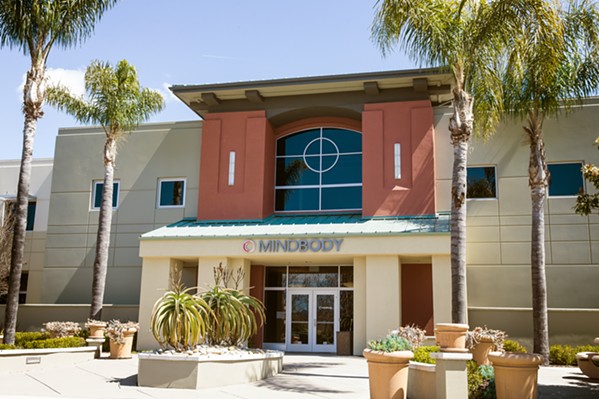'Corrupted': Judge rules that Mindbody founder Rick Stollmeyer, Vista Equity shorted ex-stockholders $48 million in sale of company
By Peter Johnson[{
"name": "Newsletter Promo",
"id": "NewsletterPromo",
"class": "inlineCenter",
"insertPoint": "4",
"component": "15264767",
"requiredCountToDisplay": "0"
},{
"name": "Ad - Medium Rectangle CC01 - 300x250",
"id": "AdMediumRectangleCC01300x250",
"class": "inlineCenter",
"insertPoint": "8",
"component": "2963441",
"requiredCountToDisplay": "12"
},{
"name": "Ad - Medium Rectangle LC01 - 300x250",
"id": "AdMediumRectangleCC01300x250",
"class": "inlineCenter",
"insertPoint": "18",
"component": "2963441",
"requiredCountToDisplay": "22"
},{
"name": "Ad - Medium Rectangle LC09 - 300x250",
"id": "AdMediumRectangleLC09300x250",
"class": "inlineCenter",
"insertPoint": "28",
"component": "3252660",
"requiredCountToDisplay": "32"
}]
Mindbody founder and ex-CEO Rick Stollmeyer is on the hook for up to $48 million in damages after a Delaware judge recently ruled that he "greased the wheels" for Vista Equity Partners to acquire the San Luis Obispo tech company for $1.9 billion in 2019.
Stollmeyer and Vista were on trial last year as part of a lawsuit filed by a class of ex-Mindbody shareholders, who alleged that the two colluded behind closed doors to ensure Vista would be the buyer. The "corrupted" process deflated Mindbody's sale price—at stockowners' expense, the suit claimed.
In a ruling released to the public on March 15, Delaware Court of Chancery Chancellor Kathaleen St. Jude McCormick sided with the shareholders, finding Stollmeyer and Vista jointly liable for damages of $1 per share. About 48 million shares were outstanding at the time of the sale, according to records.
"Plaintiffs proved that Stollmeyer created advantages for Vista in the sale process," McCormick wrote in a 120-page ruling. "The record is riddled with instances when Stollmeyer tilted the playing field in Vista's favor."
While Vista was willing to pay at least $37.50 per share for Mindbody, the deal closed at $36.50 per share thanks to Stollmeyer's meddling, she said.
"Without Stollmeyer's help, Vista would not have gotten the company for $36.50 per share," McCormick wrote.
Stollmeyer had a personal incentive to sell speedily to Vista, McCormick wrote, and he gave the private equity firm—which specializes in speedy deals—numerous advantages that allowed it to "sprint" toward making an offer ahead of the competition.
"Stollmeyer quickly came to believe that selling to Vista gave him the unique opportunity to both gain liquidity and remain as CEO," McCormick wrote. '"He did not strive in good faith to pursue the best transaction reasonably available. He instead pursued a fast sale to Vista to further his personal interests."
Compounding Stollmeyer's transgressions, McCormick wrote, was his failure to disclose his engagements with Vista, leaving most Mindbody board members and shareholders "in the dark" as they embarked on what they thought was a fair sale process.
"Stollmeyer's actions deprived the board of the information needed to employ a reasonable decision-making process," McCormick said.
In a statement to New Times about the ruling, Stollmeyer, who's currently the CEO of his son's Paso Robles-based drone company, Inspired Flight Technology, wrote: "I disagree and am disappointed with the court's opinion. However, as the litigation is still ongoing and we are exploring all options, I have no further comment at this time."
Attorneys for the plaintiffs—who were anchored by Luxor Capital Partners, Mindbody's second largest block of shareholders—expressed thanks to the court.
"We intend to continue to press for the maximum possible recovery for the class, including by defending an appeal if one is taken," the plaintiffs' counsel told New Times in a statement.
'Vista-smitten Stollmeyer'
According to McCormick's ruling, by 2018, Stollmeyer knew he wanted to sell the software company that he'd founded in 2000 and taken public in 2015.
One reason, she said, is he needed cash. Despite having grown Mindbody to "over $1 billion in market capitalization, ... Stollmeyer had never experienced a big liquidity event."
"Stollmeyer had grown frustrated with his inability to monetize his holdings of Mindbody stock, fearful of the volatility and fickleness of the public markets, and uncertain about his ability to lead Mindbody through its next stage of its growth," McCormick wrote.
Meanwhile, Stollmeyer had significant personal financial commitments to look after, including investments in family businesses and a $3 million pledge to "a local college."
"A sale of the company would solve his problems, and Stollmeyer decided it was a good time to sell," McCormick wrote.
Stollmeyer fell "in love" with Vista Equity Partners, according to the ruling, after attending a summit in August 2018 convening the ex-CEOs of public companies that Vista acquired. Calling it a "mind blowing" experience, Stollmeyer soon gave Vista indications that he was interested in selling Mindbody.
"At the summit, Vista made presentations advertising the immense wealth that [ex-CEOs] had achieved by selling to and working for Vista," McCormick wrote. "After the Vista conference, Stollmeyer's focus seemed to shift. He was no longer interested in just any sale of the company. He wanted to sell to Vista. And Stollmeyer let Vista know what he wanted."
From there, McCormick detailed a cascade of events and evidence that showed Stollmeyer's "laser focus" on Vista.
Although he had just 20 percent of Mindbody's voting power, Stollmeyer knew that the company's largest shareholder, Institutional Venture Partners (IVP), was also interested in a near-term sale. Both would see their voting powers diminish come 2021.
Last year, the class action plaintiffs agreed to a $27 million settlement with IVP and its affiliates over its role in the Vista deal.
As Stollmeyer laid the groundwork for Vista to make a quick and firm offer for the company in 2018, he simultaneously slow-rolled the sale process with the Mindbody board of directors, according to McCormick.
"Stollmeyer did not adequately involve the board or erect, much less adhere, to speed bumps to ensure a value-maximizing process," McCormick wrote. "Rather Vista-smitten Stollmeyer effectively greased the wheels for Vista by stalling the board process."
Once the sale process got moving, she said, Stollmeyer tipped Vista off at each juncture and Vista knew his target price for Mindbody. By the time that the Mindbody board began contacting bidders, "Vista was poised to pounce" with an offer.
In addition to the collusion, McCormick also gave credence to allegations that Stollmeyer intentionally tried to depress Mindbody's stock price in late 2018 to make the $1.9 billion deal look more attractive, and that the company did not disclose strong fourth quarter numbers for the same reason.
And as the sale to Vista wrapped up, both Stollmeyer and Vista failed to disclose the full extent of their dealings and communications as they were required—breaches that made them jointly liable for the $1 per share in damages, plus 5 percent compounding interest per month.
"Vista knew about its own interactions, and it was evident that Stollmeyer was not disclosing them," McCormick ruled. "Vista knowingly participated in the breach by not speaking up."
McCormick noted that "it makes no difference" whether Stollmeyer or Vista pay the approximately $48 million in damages. Δ
Assistant Editor Peter Johnson can be reached at [email protected].
Latest in News
Readers also liked…
-

Coast Unified teachers upset over new position's salary and qualifications
Oct 20, 2022 -

SLO police identify alleged driver who hit and killed couple
Dec 22, 2022 -

When the levee breaks: Oceano residents, county officials walk a tightrope of regulations to manage Arroyo Grande Creek, which some say led to the levee's failure in January
May 18, 2023











